Jeep Avenger vs Toyota RAV4 – Which car suits you better?
Both models have their strengths – but which one suits you more?
Compare performance, efficiency, price and space directly: Jeep Avenger or Toyota RAV4?
Costs and Efficiency:
Price and efficiency are key factors when choosing a car – and this is often where the real differences emerge.
Jeep Avenger has a decisively advantage in terms of price – it starts at 21900 £, while the Toyota RAV4 costs 35100 £. That’s a price difference of around 13192 £.
Fuel consumption also shows a difference: Toyota RAV4 manages with 1 L and is therefore convincingly more efficient than the Jeep Avenger with 4.90 L. The difference is about 3.90 L per 100 km.
As for range, the Jeep Avenger performs convincingly better – achieving up to 400 km, about 325 km more than the Toyota RAV4.
Engine and Performance:
Power, torque and acceleration say a lot about how a car feels on the road. This is where you see which model delivers more driving dynamics.
When it comes to engine power, the Toyota RAV4 has a clearly edge – offering 306 HP compared to 156 HP. That’s roughly 150 HP more horsepower.
In acceleration from 0 to 100 km/h, the Toyota RAV4 is significantly quicker – completing the sprint in 6 s, while the Jeep Avenger takes 9 s. That’s about 3 s faster.
In terms of top speed, the Jeep Avenger performs hardly perceptible better – reaching 194 km/h, while the Toyota RAV4 tops out at 180 km/h. The difference is around 14 km/h.
Space and Everyday Use:
Whether family car or daily driver – which one offers more room, flexibility and comfort?
Both vehicles offer seating for 5 people.
In curb weight, Jeep Avenger is decisively lighter – 1180 kg compared to 1745 kg. The difference is around 565 kg.
In terms of boot space, the Toyota RAV4 offers evident more room – 580 L compared to 380 L. That’s a difference of about 200 L.
In maximum load capacity, the Toyota RAV4 performs evident better – up to 1690 L, which is about 413 L more than the Jeep Avenger.
When it comes to payload, Toyota RAV4 a bit takes the win – 600 kg compared to 502 kg. That’s a difference of about 98 kg.
Who comes out on top?
Overall, the Toyota RAV4 shows itself to be dominates this comparison and secures the title of DriveDuel Champion.
It convinces with the more balanced overall package and proves to be the more versatile choice for everyday use.
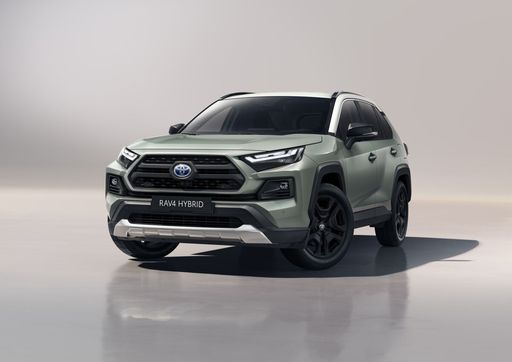 @ Toyota Motor Corporation
@ Toyota Motor Corporation
Toyota RAV4
Jeep Avenger
The Jeep Avenger shrinks Jeep's boxy, adventurous styling into a city-friendly electric crossover that looks just as at home on tight streets as it does on muddy weekend lanes. It's a savvy pick for drivers who want go-anywhere attitude without the truck-size ego — practical inside, lively around town and ready to tackle a bit of rough stuff when the mood strikes.
details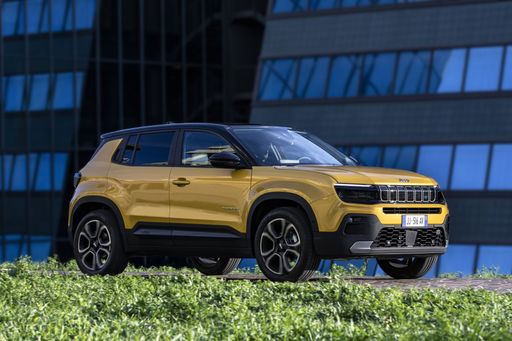 @ Jeep / Stellantis Media
@ Jeep / Stellantis Media
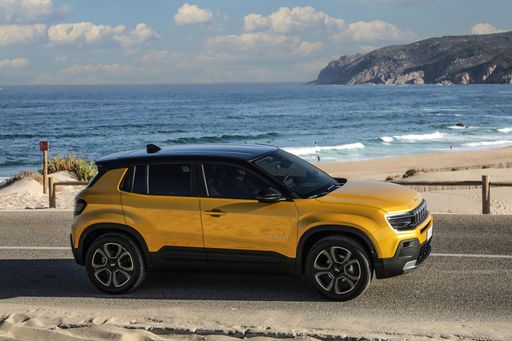 @ Jeep / Stellantis Media
@ Jeep / Stellantis Media
 @ Jeep / Stellantis Media
@ Jeep / Stellantis Media
 @ Jeep / Stellantis Media
@ Jeep / Stellantis Media
 @ Jeep / Stellantis Media
@ Jeep / Stellantis Media
Toyota RAV4
The Toyota RAV4 feels like a sensible friend on the road, marrying dependable practicality with a dash of SUV personality that keeps daily driving from turning dull. Comfortable and easy to live with, it looks tough without shouting and quietly gets the job done — a sensible pick for buyers who want versatility without drama.
details @ Toyota Motor Corporation
@ Toyota Motor Corporation
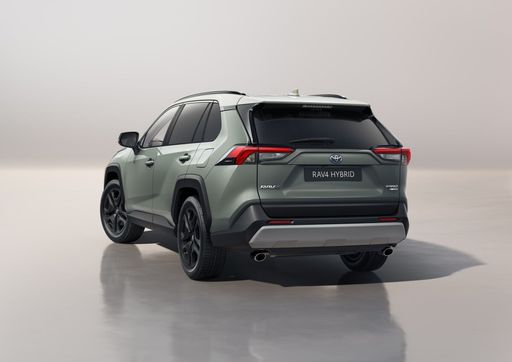 @ Toyota Motor Corporation
@ Toyota Motor Corporation
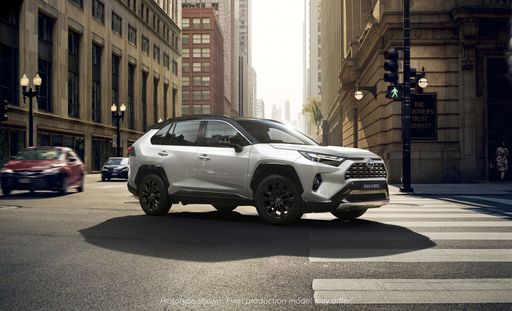 @ Toyota Motor Corporation
@ Toyota Motor Corporation
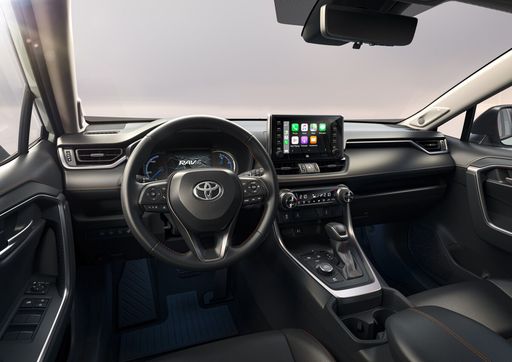 @ Toyota Motor Corporation
@ Toyota Motor Corporation
 @ Jeep / Stellantis Media
@ Jeep / Stellantis Media
|
 @ Toyota Motor Corporation
@ Toyota Motor Corporation
|
|
|
|
Costs and Consumption |
|
|---|---|
|
Price
21900 - 36900 £
|
Price
35100 - 55700 £
|
|
Consumption L/100km
4.9 - 5.7 L
|
Consumption L/100km
1 - 5.6 L
|
|
Consumption kWh/100km
15.50 kWh
|
Consumption kWh/100km
-
|
|
Electric Range
400 km
|
Electric Range
75 km
|
|
Battery Capacity
51 kWh
|
Battery Capacity
-
|
|
co2
0 - 129 g/km
|
co2
22 - 128 g/km
|
|
Fuel tank capacity
44 L
|
Fuel tank capacity
55 L
|
Dimensions and Body |
|
|---|---|
|
Body Type
SUV
|
Body Type
SUV
|
|
Seats
5
|
Seats
5
|
|
Doors
5
|
Doors
5
|
|
Curb weight
1180 - 1520 kg
|
Curb weight
1745 - 1910 kg
|
|
Trunk capacity
325 - 380 L
|
Trunk capacity
520 - 580 L
|
|
Length
4084 - 4088 mm
|
Length
4600 mm
|
|
Width
1776 mm
|
Width
1855 mm
|
|
Height
1527 - 1541 mm
|
Height
1685 mm
|
|
Max trunk capacity
1218 - 1277 L
|
Max trunk capacity
1604 - 1690 L
|
|
Payload
494 - 502 kg
|
Payload
390 - 600 kg
|
Engine and Performance |
|
|---|---|
|
Engine Type
Electric, Petrol, Petrol MHEV
|
Engine Type
Full Hybrid, Plugin Hybrid
|
|
Transmission
Automatic, Manuel
|
Transmission
Automatic
|
|
Transmission Detail
Reduction Gearbox, Manual Gearbox, Dual-Clutch Automatic
|
Transmission Detail
CVT
|
|
Drive Type
Front-Wheel Drive, All-Wheel Drive
|
Drive Type
Front-Wheel Drive, All-Wheel Drive
|
|
Power HP
100 - 156 HP
|
Power HP
218 - 306 HP
|
|
Acceleration 0-100km/h
9 - 10.6 s
|
Acceleration 0-100km/h
6 - 8.4 s
|
|
Max Speed
150 - 194 km/h
|
Max Speed
180 km/h
|
|
Torque
205 - 260 Nm
|
Torque
-
|
|
Number of Cylinders
3
|
Number of Cylinders
4
|
|
Power kW
74 - 115 kW
|
Power kW
160 - 225 kW
|
|
Engine capacity
1199 cm3
|
Engine capacity
2487 cm3
|
General |
|
|---|---|
|
Model Year
2023 - 2025
|
Model Year
2024 - 2025
|
|
CO2 Efficiency Class
A, D, C
|
CO2 Efficiency Class
D, B
|
|
Brand
Jeep
|
Brand
Toyota
|
What drivetrain options does the Jeep Avenger have?
Available configurations include Front-Wheel Drive or All-Wheel Drive.
The prices and data displayed are estimates based on German list prices and may vary by country. This information is not legally binding.
